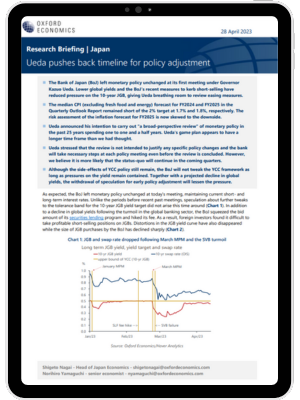Japan: Ueda pushes back timeline for policy adjustment

The Bank of Japan (BoJ) left monetary policy unchanged at its first meeting under Governor Kazuo Ueda. Lower global yields and the BoJ’s recent measures to kerb short-selling have reduced pressure on the 10-year JGB, giving Ueda breathing room to review easing measures.
What you will learn:
- The median CPI (excluding fresh food and energy) forecast for FY2024 and FY2025 in the Quarterly Outlook Report remained short of the 2% target at 1.7% and 1.8%, respectively. The risk assessment of the inflation forecast for FY2025 is now skewed to the downside.
- Ueda stressed that the review is not intended to justify any specific policy changes and the bank will take necessary steps at each policy meeting even before the review is concluded. However, we believe it is more likely that the status-quo will continue in the coming quarters.
- Although the side-effects of YCC policy still remain, the BoJ will not tweak the YCC framework as long as pressures on the yield remain contained. Together with a projected decline in global yields, the withdrawal of speculation for early policy adjustment will lessen the pressure.
Tags:
Related posts

Post
How Asia’s supply chains are changing | Techonomics Talks
Global supply chains have continued to expand, despite talk of deglobalization and nearshoring. US and Japan have started to de-couple from China, but other G7 countries grow more dependent on Chinese inputs. Several "hotspots" are emerging across Asia with multiple winning formulas.
Find Out More
Post
BoJ to raise its policy rate cautiously to 1% by 2028
We now project that the Bank of Japan will start to raise its policy rate next spring assuming another robust wage settlement at the Spring Negotiation. If inflation remains on a path towards 2%, the BoJ will likely raise rates cautiously to a terminal rate of around 1% in 2028.
Find Out More
Post
Japan inflation to rise to 1.8%, but downside risks are high
Reflecting a surprisingly strong Spring Negotiation result and weaker yen assumption, we have upgraded our baseline wage and inflation forecasts. We now project higher wage settlements will push inflation towards 1.8% by 2027. Uncertainty is high, however.
Find Out More